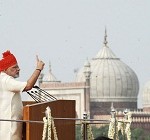The Narendra Modi government has been hyperactive in the foreign policy arena in these first 100 days. The new government wants to overturn the Congress and Nehruvian consensus that has dominated India’s foreign policy thinking, and the way the world has viewed India.
South Asia
By inviting all the SAARC heads to his swearing-in ceremony, Modi signaled his intent to focus on the neighbourhood.
The Modi-Sharif bonhomie at the swearing-in ceremony raised hopes that the quality of interaction between the two neighbours would change. But Pakistan is imploding, so India should direct its energies at strengthening ties with the other SAARC countries.
Modi’s decision to make Nepal and Bhutan his first foreign policy stops must be followed up as both countries have massive hydropower potential.
India should push through the Teesta water-sharing accord and the Land Boundary Agreement, as well as undo the damage caused by communal rhetoric on illegal immigrants from Bangladesh.
The Sri Lanka government has made positive overtures by releasing Indian fishermen and sharing intelligence on LeT operatives. However, India must reiterate that the Thirteenth Amendment to the Sri Lankan constitution is the basis for ending the discrimination faced by Sri Lankan Tamils.
Permanent Five
China has collaborated openly with Pakistan to box India in South Asia, even as it has expanded economic, infrastructure and defence relations with other SAARC countries. Modi’s visit to Japan has aroused concern in China, and India must calibrate between the two countries keeping our economic interests paramount.
Russia
Increase outreach to Russia, our longstanding, dependable ally.
U.S., UK, France
The U.S. and the UK have dispatched numerous cabinet-level officials to India, while France pushed for the $12-billion deal to sell Rafale combat aircraft to India.
Recommendation:
In his forthcoming visit to the U.S., Modi must focus on a tech-driven agenda to redefine the bilateral engagement between the private sectors and the people of the two countries. Bilateral trade can increase from $100 billion today to $1 trillion by 2030.
Other bilaterals
Germany
No visible outreach although Germany is the most important European country and significant in the NATO-Russia contestation over Ukraine.
Japan
Progress has been made towards the nuclear energy accord which will give substance to the “Special Strategic and Global Partnership”. The $35 billion promised Japanese aid and investment in manufacturing and infrastructure can stimulate the Indian economy, as Japan did for China in the 70s.
Iran
There has been no visible outreach despite Iran being a crucial supplier of crude oil to India, converging interests on Afghanistan, and providing access to Central Asia. There is now a very real possibility of the West resolving differences with Iran on its nuclear programme and working together against the Islamic State terrorists.
Regions
West Asia
India’s close defence ties with Israel must not preclude sympathy for Palestinian victims in Gaza.
Recommendation:
India must steer through sectarian struggles that have divided the people as West Asia is a crucial source of energy and home to a sizeable expat population.
Latin America and Africa
Regrettable absence of outreach.
Trade Blocs
BRICS
Modi displayed welcome agility in accepting the choice of Shanghai as the location of the New Development Bank, given the need to challenge the existing financial dominance of the western powers.
WTO and ASEAN
The last minute rejection of the trade facilitation agreement at the WTO was poorly managed. Not showing up in Myanmar to sign the free trade agreement (FTA) in services and investment with ASEAN was another ill advised move that might damage India’s long term credibility on reform and openness.
Recommendations going forward:
*Finding a fine balance between China, Japan and the U.S
India must remain balanced in the global rivalry between China and the U.S., as what happens in Asia affects us most. At a regional level, India should hedge Chinese expansion by cementing ties with Vietnam, Japan and Australia.
*A full-time defence minister needed
Continuing to leave Arun Jaitley with two important portfolios is baffling in a rapidly changing strategic scenario. Finance and defence are critical portfolios and both need a full-time minister.
*Reorganise defence forces
The most immediate threat to our borders comes from China and Pakistan that collude on strategic and nuclear matters. With the rise of the Islamic State taking the focus back to the Arab world, Pakistan is no longer under as much scrutiny and will increase the use of non-state actors to hurt India. India’s police and intelligence agencies need to be reorganised and upgraded as are the defence forces heavy on manpower, but inadequate in technology and training. Space and cyber defence call for greater attention.
*Strengthening maritime security
A concerted focus on the Bay of Bengal Initiative for Multi-Sectoral Technical and Economic Cooperation (BIMSTEC) and the Indian Ocean Rim Association of Regional Cooperation (IOR-ARC) is needed given China’s increasing presence in both regions.
None of the above will happen unless India is able to sustain higher and more equitable economic growth.
This article was exclusively written for Gateway House: Indian Council on Global Relations. You can read more exclusive content here.
For interview requests with the author, or for permission to republish, please contact outreach@gatewayhouse.in.
© Copyright 2014 Gateway House: Indian Council on Global Relations. All rights reserved. Any unauthorized copying or reproduction is strictly prohibited


